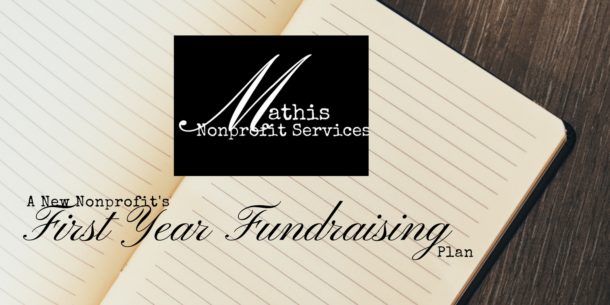Events take a lot of time and planning. If they are part of your Fundraising Plan, they can help you get to your fundraising goals. For fun, I asked a few local experts in the nonprofit world who plan events several times a year to give me their best tips. What follows is some really good advice.
Event Tip #1
“Once you do all the work to plan an excellent event, don’t forget to think about how people at the event will actually donate. Make sure the methods for giving are simple, clear, and easy to find. People will come to your event because they care about your cause — make it really easy for them to donate while they are there!” – Stephen Story, Executive Director, Covenant Care Adoptions
Event Tip #2
“Creating a checklist to provide a step-by-step guide when organizing and executing the event is key. Don’t get discouraged if you don’t check every box. Items do get edited along the way. You’ll be able to reflect on what was your goal, monitor your progress and ultimately achieve and realize your vision. You’ll learn what works and does not work. I hope this is somewhat helpful.” –Cheryl Glover, Resource Development Director, Houston County (GA) Habitat for Humanity
Event Tip #3
“Communication with your volunteers is key to a successful event. This helps to make the American Cancer Society’s Relay For Life of Houston County. “ Event Lead- Elizabeth Lange, Event Lead, American Cancer Society’s Relay for Life of Houston County
Event Tip #4
“Marketing your event using social media platforms is very important in spreading the word about your event. Boosting your event on FB is cheap, and well worth it because the number of people reached doubles easily.
‘Procrastination makes easy things hard, hard things harder.‘ -Mason Cooley
Work ahead of schedule so that your plate isn’t full of things to do the week of your event.
Also, be sure to thank your guests/donors/sponsors for coming out and supporting your event, let them know that they played an important role in impacting your mission and that you value them.” – Lacey Meador, Events Coordinator, The Methodist Home for Children and Youth
Event Tip # 5
“One tip…be flexible in your planning. Not everything is going to go as planned. We try to plan for every little detail but something always comes up that was not expected. Do the best you can by making the best of the situation… looking at the challenge as an opportunity for you to shine. “ – Marian McLemore, VP of Cooperative Communications, Flint Energies
Bonus
With all these tips, what are some strategies your new or small nonprofit can use to plan your next event? Here are a few of the strategies I learned from events.
Event Strategy #1
Make a clear plan and define your goals. If you have a Fundraising Plan, this step is easier because you’ve already defined the event and amount of money you want to raise. Put in writing your milestones (the activities that have to be done for the event to move forward) and then all the details that fall under your milestone.
Event Strategy #2
Keep an eye on cost with a budget. Planning an event without a budget is fundraising suicide. Sticking to a budget equals success. Decide on the amount you can spend on a successful event. Think through everything you will need and assign costs accordingly. And no matter how much you don’t want to, keep track of your expenditures and say no when you have to.
Event Strategy #3
Get help. Events are not made for one person. While you will need someone in charge, you also need a mighty team to get things done. It can be the Board or volunteers or a combination of both. Having one or two people assigned to marketing the event and making calls to narrow down the details will help more than you can imagine.
Event Strategy #4
Follow up. Follow up after the event with your volunteers and donors to say thank you. Report the impact your event had on the mission. (Often that is in dollars).
Event Strategy #5
Do a Right, Wrong, Missing, and Confusing report internally. I had a boss who called it a post-mortem once but whatever you call it, take the time to go over the event with those involved with the planning to get an idea of what to do again and what to avoid. Write it down and keep it safe until next year. This information will be invaluable when you go to plan next year. It also helps you remember what you did and how you did it (things I promise you won’t remember with crystal clarity when the time comes).
There you have it- five tips and five strategies for a successful event. Leave a comment and give us your best advice for holding a successful event.


 Most nonprofit leaders lay awake at night trying to figure out how to fund their mission.
Hi! I'm Alesha.
I teach sustainable fundraising in a way that they can take action today so they can serve their clients.
I can help you move from just getting started funding your new nonprofit to gaining confidence in your fundraising and building relationships to knowing what works for your organization and looking at the infinite game when it comes to funding. I’ve worked with nonprofit Founders and written the book I HAVE MY 501(C)3! NOW WHAT?!? Your Blueprint to Starting Your Nonprofit Without Being the Sole Funder that lays the foundations for funding in a new nonprofit.
I’ve worked in Development (Fundraising) Departments in large organizations and I know the no cost, low-cost methods they use to bring in funding. I bring those sound strategies to the nonprofits I serve.
Most nonprofit leaders lay awake at night trying to figure out how to fund their mission.
Hi! I'm Alesha.
I teach sustainable fundraising in a way that they can take action today so they can serve their clients.
I can help you move from just getting started funding your new nonprofit to gaining confidence in your fundraising and building relationships to knowing what works for your organization and looking at the infinite game when it comes to funding. I’ve worked with nonprofit Founders and written the book I HAVE MY 501(C)3! NOW WHAT?!? Your Blueprint to Starting Your Nonprofit Without Being the Sole Funder that lays the foundations for funding in a new nonprofit.
I’ve worked in Development (Fundraising) Departments in large organizations and I know the no cost, low-cost methods they use to bring in funding. I bring those sound strategies to the nonprofits I serve.